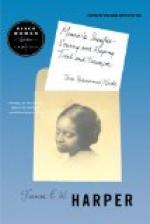“But, darling, if large numbers of these Republicans stayed at home, and let the election go by default, the result was just the same. Now every rebel can throw it in our teeth and say, ’See your great Republican party; they refuse to let the negro vote with them, but they force him upon us. They don’t do it out of regard to the negro, but only to spite us.’ I don’t think, Minnie, that I am much given to gloomy forebodings, but I see from the temper and actions of these rebels, that they are encouraged and emboldened by these tidings from the North, and to-day they are turning people out of work for voting the radical ticket. A while ago they tried flattery and cajolery. You could hear it on almost every side—’We are the best friends of the colored people.’ Appeals were made to the memories of the past; how they hunted and played together, and searched for birds’ nests in the rotten peach trees, and when the colored people were not to be caught by such chaff, some were trying to force them into submission by intimidation and starvation.”
Just then a knock was heard at the door, and a dark man entered. There was nothing in his appearance that showed any connection with the white race. There was a tone of hopefulness in his speech, though his face wore a somewhat anxious expression.
“Good morning, Mr. Jackson,” said Louis, for, in deference to their feelings he had dropped the “aunt” and “uncle” of bygone days.
“Good morning,” replied the man, while a pleasant smile flitted over his countenance.
“How does the world use you?” said Louis.
“Well, times are rather bilious with me, but I am beginning to pick up a little. I get a few boots and shoes to mend. I always used to go to the mountains, and get plenty of work to do; but this year they wouldn’t give me the situation because I had joined the radicals.”
“What a shame,” said Louis; “these men who have always had their rights of citizenship, seem to know so little of the claims of justice and humanity, that they are ready to brow-beat and intimidate these people for voting according to their best interests. And what saddens me most is to see so many people of the North clasping hands with these rebels and traitors, and to hear it repeated that these people are too ignorant to vote.”
“Ignorant as they are,” said Minnie, “during the war they knew more than their masters; for they knew how to be true to their country, when their masters were false to it, and rallied around the flag, when they were trampling it under foot, and riddling it with bullets.”
“Ah!” said uncle Richard, “I knows them of old. Last week some of them offered me $500 if I would desert my party; but I wasn’t going to forsake my people. I have been in purty tight places this year. One night when I come home my little girl said to me, ’Daddy, dere ain’t no bread in de house.’ Now, that jist got me, but I begun to pray, and the next day I found a quarter of a dollar, and then some of my colored friends said it wouldn’t do to let uncle Jack starve, and they made me up seventy-five cents. My wife sometimes gets out of heart, but she don’t see very far off.”




